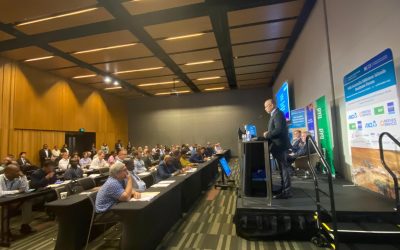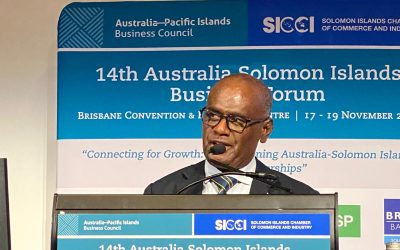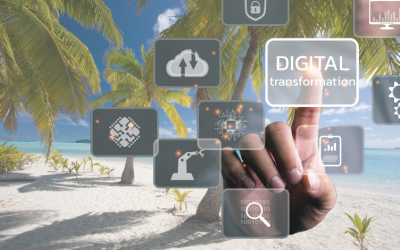Politicians from across the region used the Australia Pacific Islands Business Council-led Pacific Infrastructure Conference in Brisbane to signal an investment agenda built on local content, climate resilience and better connectivity. Their messages to contractors, financiers and development partners converged on a simple theme: projects must be Pacific-led, technically sound and designed to lift long-term productivity as well as livelihoods.
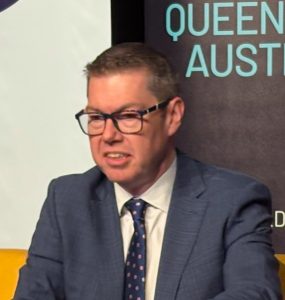
Australian Minister for the Pacific Pat Conroy at the Pacific Infrastructure Conference. Photo: Dev Nadkarni
Australia’s Minister for International Development and the Pacific, Pat Conroy, framed Canberra’s approach as “Pacific priorities first,” backed by the Australian Infrastructure Financing Facility for the Pacific and the Pacific Climate Infrastructure Financing Partnership. He highlighted climate-resilient assets, clean energy and essential services, and announced A$11 million for Solomon Islands projects to be delivered by local companies. Conroy also pointed to regional telecommunications cables, aviation upgrades and extended support for Qantas’s Palau Paradise Express as examples of how connectivity can crowd in tourism and trade.
Papua New Guinea’s Deputy Prime Minister, John Rosso, called for quality, resilience and connectivity across a country with complex terrain and diverse communities. He stressed the importance of local content, collaboration and rigorous monitoring, and thanked Australia and Japan for delivery partnerships. Click here to watch DPM John Rosso’s interview with APIBC.
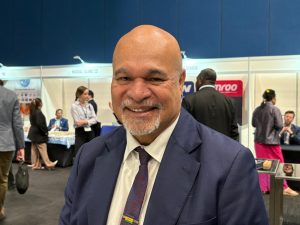
PNG Deputy Prime Minister John Rosso. Photo: Dev Nadkarni
Port Moresby’s near-term focus includes solar power, green financing and responsible borrowing, with a parallel urban programme that partners the private sector to deliver affordable housing and plan a new city using customary land and local materials. Rosso underscored that private capital will only scale where procurement is credible, laws are clear and government support is consistent.
Palau’s President, Surangel Whipps Jr, placed energy transition and climate-proofed infrastructure at the centre of his pitch, citing solar projects, coastal relocation and upgrades to hospitals, schools and airports. He argued that environmental protection and economic development must move together, with modernised fishing ports and cultural-site improvements balancing food security, visitor experience and export potential. Whipps invited Pacific companies to take a larger role in delivery.
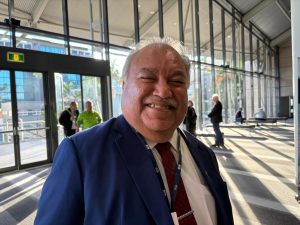
Pacific Islands Forum General Secretary Baron Waqa at the conference. Photo: Dev Nadkarni
Pacific Islands Forum Secretary General, Baron Waqa, set the strategic frame. He linked the region’s exposure to climate and disaster risk to the Forum’s 2050 Strategy for the Blue Pacific Continent and to the Pacific Quality Infrastructure principles. Those principles call for infrastructure that meets community needs, is technically robust and is environmentally and socially responsible, providing a common yardstick for project design.
Japan’s Parliamentary Vice-Minister for Foreign Affairs, Ikuina Akiko, reaffirmed Tokyo’s commitment to bridges, airports and disaster preparedness, and to technology that improves daily life. She stressed collaboration with partners and acknowledged the financing constraints facing island governments.
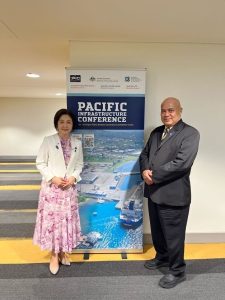
Japan’s Parliamentary Vice-Minister for Foreign Affairs, Ikuina Akiko with Tuvalu Prime Minister Feleti Teo at the conference. Photo: supplied
For business, the takeaway is clear. The pipeline favours climate-smart assets that create local jobs, strengthen grids and runways, and improve digital reach. Delivery will be judged on resilience gains, reliability and local participation, not on headline spend alone.

